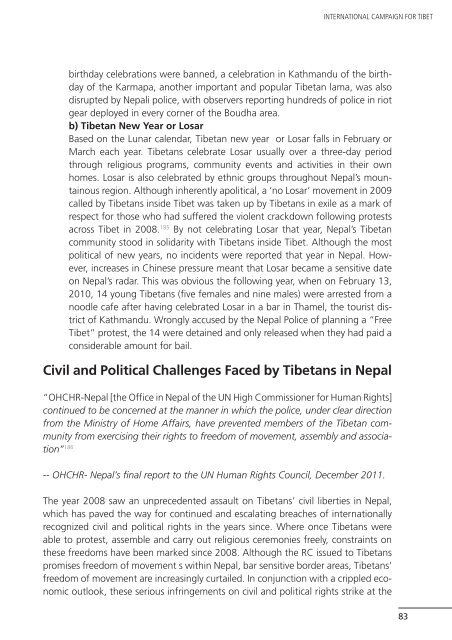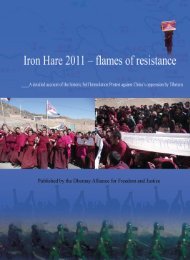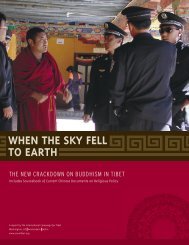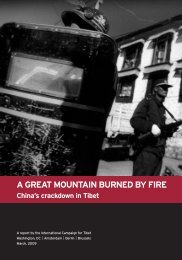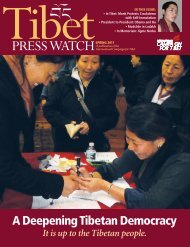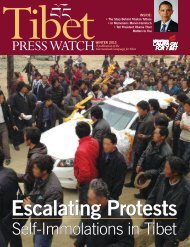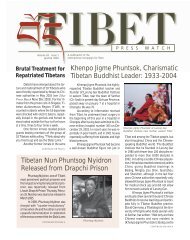DANGEROUS CROSSING: - International Campaign for Tibet
DANGEROUS CROSSING: - International Campaign for Tibet
DANGEROUS CROSSING: - International Campaign for Tibet
Create successful ePaper yourself
Turn your PDF publications into a flip-book with our unique Google optimized e-Paper software.
INTERNATIONAL CAMPAIGN FOR TIBET<br />
birthday celebrations were banned, a celebration in Kathmandu of the birthday<br />
of the Karmapa, another important and popular <strong>Tibet</strong>an lama, was also<br />
disrupted by Nepali police, with observers reporting hundreds of police in riot<br />
gear deployed in every corner of the Boudha area.<br />
b) <strong>Tibet</strong>an New Year or Losar<br />
Based on the Lunar calendar, <strong>Tibet</strong>an new year or Losar falls in February or<br />
March each year. <strong>Tibet</strong>ans celebrate Losar usually over a three-day period<br />
through religious programs, community events and activities in their own<br />
homes. Losar is also celebrated by ethnic groups throughout Nepal’s mountainous<br />
region. Although inherently apolitical, a ‘no Losar’ movement in 2009<br />
called by <strong>Tibet</strong>ans inside <strong>Tibet</strong> was taken up by <strong>Tibet</strong>ans in exile as a mark of<br />
respect <strong>for</strong> those who had suffered the violent crackdown following protests<br />
across <strong>Tibet</strong> in 2008. 185 By not celebrating Losar that year, Nepal’s <strong>Tibet</strong>an<br />
community stood in solidarity with <strong>Tibet</strong>ans inside <strong>Tibet</strong>. Although the most<br />
political of new years, no incidents were reported that year in Nepal. However,<br />
increases in Chinese pressure meant that Losar became a sensitive date<br />
on Nepal’s radar. This was obvious the following year, when on February 13,<br />
2010, 14 young <strong>Tibet</strong>ans (five females and nine males) were arrested from a<br />
noodle cafe after having celebrated Losar in a bar in Thamel, the tourist district<br />
of Kathmandu. Wrongly accused by the Nepal Police of planning a “Free<br />
<strong>Tibet</strong>” protest, the 14 were detained and only released when they had paid a<br />
considerable amount <strong>for</strong> bail.<br />
Civil and Political Challenges Faced by <strong>Tibet</strong>ans in Nepal<br />
“OHCHR-Nepal [the Office in Nepal of the UN High Commissioner <strong>for</strong> Human Rights]<br />
continued to be concerned at the manner in which the police, under clear direction<br />
from the Ministry of Home Affairs, have prevented members of the <strong>Tibet</strong>an community<br />
from exercising their rights to freedom of movement, assembly and association”<br />
186<br />
-- OHCHR- Nepal’s final report to the UN Human Rights Council, December 2011.<br />
The year 2008 saw an unprecedented assault on <strong>Tibet</strong>ans’ civil liberties in Nepal,<br />
which has paved the way <strong>for</strong> continued and escalating breaches of internationally<br />
recognized civil and political rights in the years since. Where once <strong>Tibet</strong>ans were<br />
able to protest, assemble and carry out religious ceremonies freely, constraints on<br />
these freedoms have been marked since 2008. Although the RC issued to <strong>Tibet</strong>ans<br />
promises freedom of movement s within Nepal, bar sensitive border areas, <strong>Tibet</strong>ans’<br />
freedom of movement are increasingly curtailed. In conjunction with a crippled economic<br />
outlook, these serious infringements on civil and political rights strike at the<br />
83


